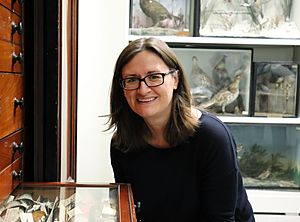Rebecca Kilner facts for kids
Quick facts for kids
Rebecca Kilner
|
|
|---|---|

in the University Museum of Zoology bird store
|
|
| Alma mater | University of Oxford (BA) University of Cambridge (PhD) |
| Scientific career | |
| Institutions | University of Cambridge, Cambridge University Museum of Zoology |
Rebecca M. Kilner is a British scientist who studies evolution. She is a professor of evolutionary biology at the University of Cambridge. This means she teaches and does research on how living things change over time. She is also a Fellow of the Royal Society (FRS) and a Fellow of the Royal Entomological Society (FRES).
Contents
Becoming a Scientist
Rebecca Kilner studied Zoology at the University of Oxford and earned her first degree in 1992. Zoology is the study of animals.
Then, she went to the University of Cambridge to get her PhD in evolutionary biology in 1996. A PhD is a very high degree that shows you are an expert in your field.
After her studies, she worked as a researcher at Magdalene College, Cambridge. In 1998, she received a special award called the Royal Society Dorothy Hodgkin Fellowship. This helped her continue her research.
In 2005, she became a Lecturer at the University of Cambridge. This means she taught students and did research. She became a Reader in 2009, which is a step up from Lecturer.
In 2013, Rebecca Kilner became a full Professor of evolutionary biology at the University of Cambridge. This is a top position for a university scientist. In 2019, she also became a Director of the Cambridge University Museum of Zoology. This museum has many animal specimens for study and display.
What Rebecca Kilner Studies
Professor Kilner's research focuses on how social behavior can lead to new kinds of living things. She mainly studies burying beetles and birds.
Bird Behavior and Evolution
Early in her career, Rebecca Kilner studied birds that are brood parasites. These birds lay their eggs in the nests of other bird species. They trick other birds into raising their young.
- Cuckoos: She found that cuckoos can lay eggs that look very similar to the eggs of their host birds. This trick helps the cuckoo eggs blend in.
- Cowbirds: She also studied cowbirds, which are also brood parasites. Unlike cuckoos, cowbird chicks do not try to push out the host chicks. Instead, cowbird chicks actually grow better when there are other host chicks in the nest.
Burying Beetle Family Life
Burying beetles are special because both parents often care for their young. Professor Kilner's work has shown some amazing things about these beetles:
- Food Preparation: Beetle parents make a slimy mix that helps good bacteria grow on the meat they give their baby beetles (larvae). These bacteria help the larvae digest their food. They also stop the meat from rotting, so the larvae grow bigger and healthier.
- Adapting to No Parents: She did an experiment where beetle parents were stopped from caring for their larvae for 30 generations. She found that the larvae changed over time. They grew bigger jaws to help them eat carcasses by themselves. Also, larvae without parents were less competitive with each other. They actually survived better than larvae whose parents were taken away suddenly.
Beetles and Mites Working Together
Professor Kilner's research also showed that burying beetles can have a special partnership with tiny creatures called mites. This is called a symbiotic relationship.
- Smaller beetles often lose fights with bigger beetles over food.
- But, a certain type of mite, Poecilochirus carabi, can help these smaller beetles.
- These mites hitch a ride on the beetles. They help the beetles warm up.
- This extra warmth helps the smaller beetles win fights against other beetles for food.
In 2023, Professor Kilner talked about her research on the BBC radio show The Life Scientific. She discussed how social behaviors, like those of burying beetles, drive evolution.
Awards and Recognition
Rebecca Kilner has received several important awards for her work:
- In 2010, she won the Zoological Society of London's Scientific Medal. This was for her "outstanding contributions" to understanding animal behavior and evolution.
- In 2015, the Royal Society gave her the Wolfson Research Merit Award. This award supported her research on how social evolution creates new kinds of living things.
- In 2021, she became a Fellow of the Royal Society. This is a very high honor for scientists in the UK. It recognized her discoveries about how social behavior causes evolutionary change.
 | Shirley Ann Jackson |
 | Garett Morgan |
 | J. Ernest Wilkins Jr. |
 | Elijah McCoy |

